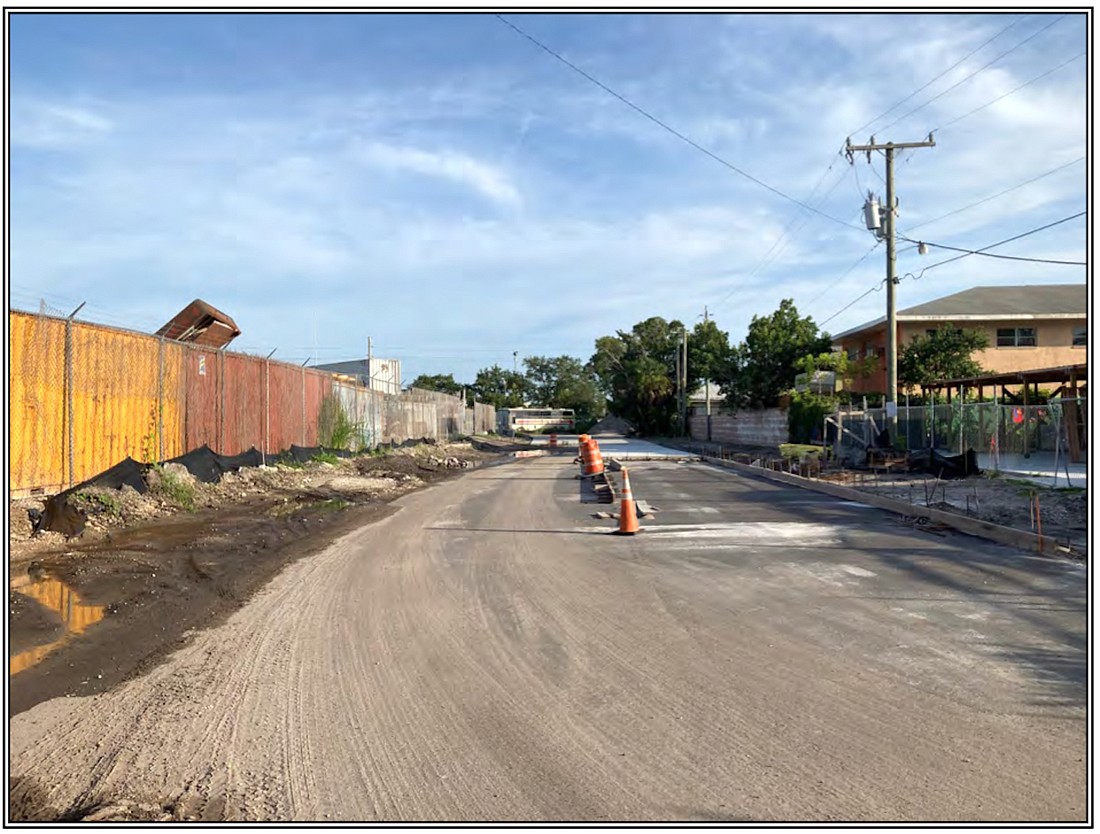- April 25, 2024
-
-
Loading

Loading

The worlds of industrial and residential land uses are colliding in the Central Cocoanut neighborhood, where for half a decade residents have complained about the growing activities and the noxious byproducts of U.S. Recycling, a construction and demolition recycling company.
More than simply a noise nuisance, occupants of homes in the historic neighborhood adjacent to and even several blocks away from the site came out in force to the Sarasota City Commission on Aug. 1 meeting to discuss — and demonstrate via audio and video — vibrations from dump trucks and jackhammers, trucks speeding through the neighborhood and clouds of toxin-filled dust covering cars, homes and even a nearby park, endangering their health and violating ease of enjoyment of their homes.
It’s a tale of multi-jurisdictional havoc, with the city of Sarasota having the least leverage in resolving the matter. During her presentation, Commissioner Jen Ahearn-Koch, who has been meeting with residents, company representatives, and county and state officials on the issue for some two years, cited county inspections taking place when the most noxious activities were idle — concrete crushing — that authority ceded to the county by the Florida Department of Environmental Protection.
Commissioners and residents expressed their dismay that two inspections over two years were done while the facility was largely inactive, resulting in the company being declared in compliance.
“The ZIP codes that make up Newtown and Central Cocoanut districts have the highest rate of emergency room admissions and hospitalizations for asthma of any ZIP code in Florida,” Koch said. “I think that is quite telling. We as a city are doing everything in our authority that we can do.”
What the city is doing is requiring a wall built around the 137,754-square-foot site located at 1404 Industrial Court. That will hide some of the activities from view, Ahearn-Koch said, but will do little about the noise and dust. The city is also planning to repair and pave Industrial Court, a short street serving the site, to help mitigate noises from trucks bouncing along the pothole-filled street.
All that will provide little relief to residents along 15th Street abutting the site, and streets radiating from Central Avenue nearby. Central Cocoanut surrounds an industrial area that bounded by 10th Street to the South, 15th Street to the north, Central Avenue to the west and unused Seminole Gulf Railway tracks to the east.
Residents pointed out, they were there long before U.S. Recycling, where activities begin early in the mornings and continue into late evenings, on weekends and even holidays. Leadership of U.S. Recycling, Ahearn-Koch said, were involved in meetings early on, but have since deferred to legal counsel representation.
Commissioners individually agreed the living conditions around the site are untenable while also wondering aloud about the city’s authority to resolve the matter. By right the company can operate on the site and environmental and health matters are the purview of the state, in this case delegated to Sarasota County, which to date has provided no relief.
Ahearn-Koch supplied an appraisal of the property, valued at $1.65 million. According to the appraisal, prepared by Bass Fletcher & Associates of Sarasota, "The subject is entirely within the Industrial zoning district of the City of Sarasota. The subject is also within the Multi-family Moderate Density future land use district. These districts are inconsistent with one another. The existing zoning is intended for a range of industrial, office and heavy commercial uses. Despite the inconsistency with the future land use designation, this zoning and the current use would be allowed to continue indefinitely."
Vice Mayor Kyle Battie floated the idea of the city acquiring the property via imminent domain. City Attorney Robert Fournier confirmed that approach is feasible, providing its reuse is of public benefit, such as a park or affordable housing. Short of a forced sale, Commissioner Hagen Brody said the city has the ability to enhance the value of the property to perhaps entice U.S. Recycling to be a willing seller.
“The greatest power that we have as a local body is through our zoning. We can make a piece of dirt worth a lot depending on what you can do with it,” Brody said. “I truly think the long-term solution has to come through change of use, and zoning to transfer the property.”
That value could be diminished pending soil and water testing. More than the land, though, is the value of the business. “They may be making so much money there that the seesaw doesn't tip the scale the other way,” Brody said.
With no clear solution immediately apparent, commissioners unanimously agreed on a multi-pronged strategy, approving a meandering motion with multiple friendly amendments that includes: